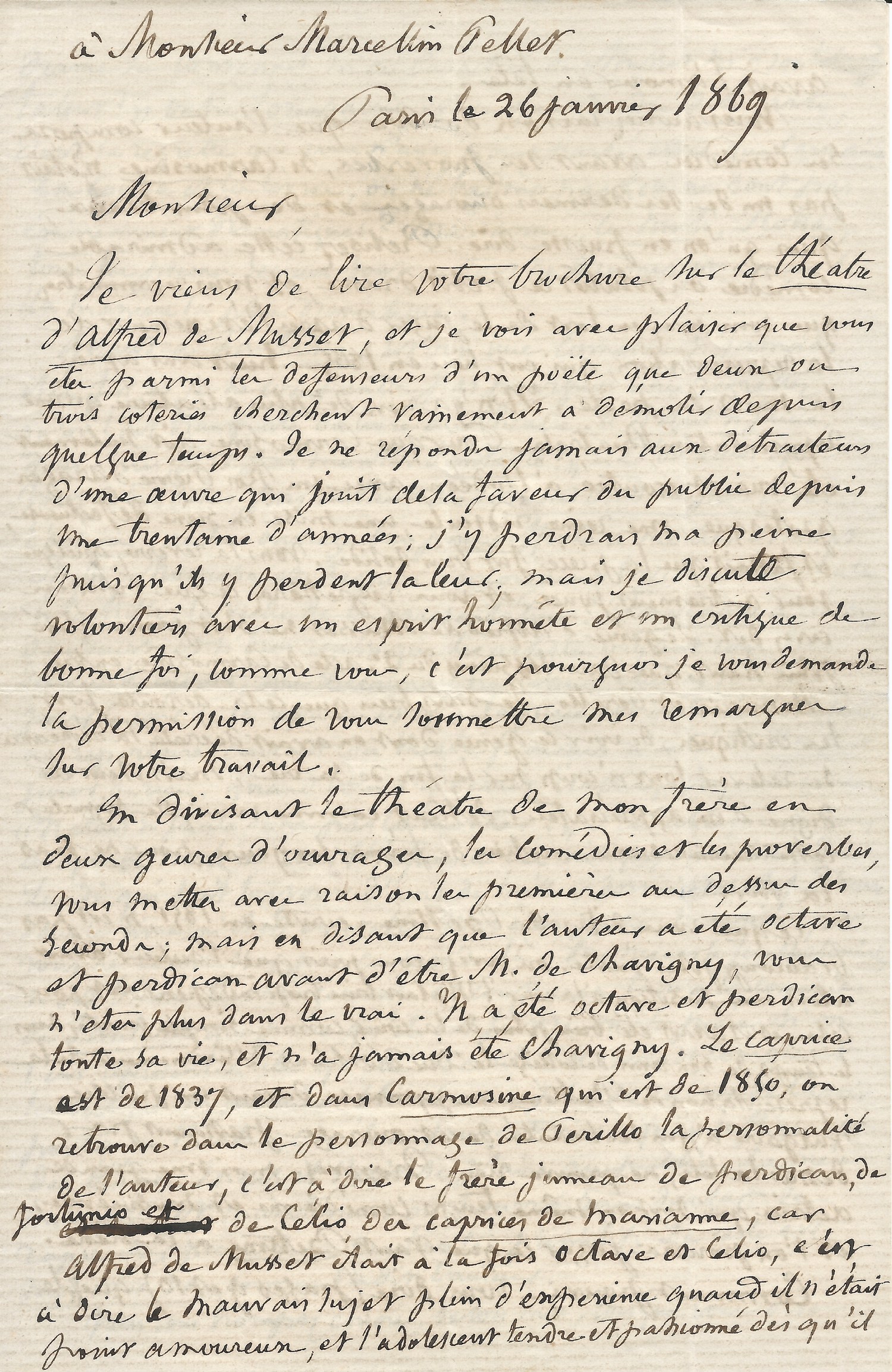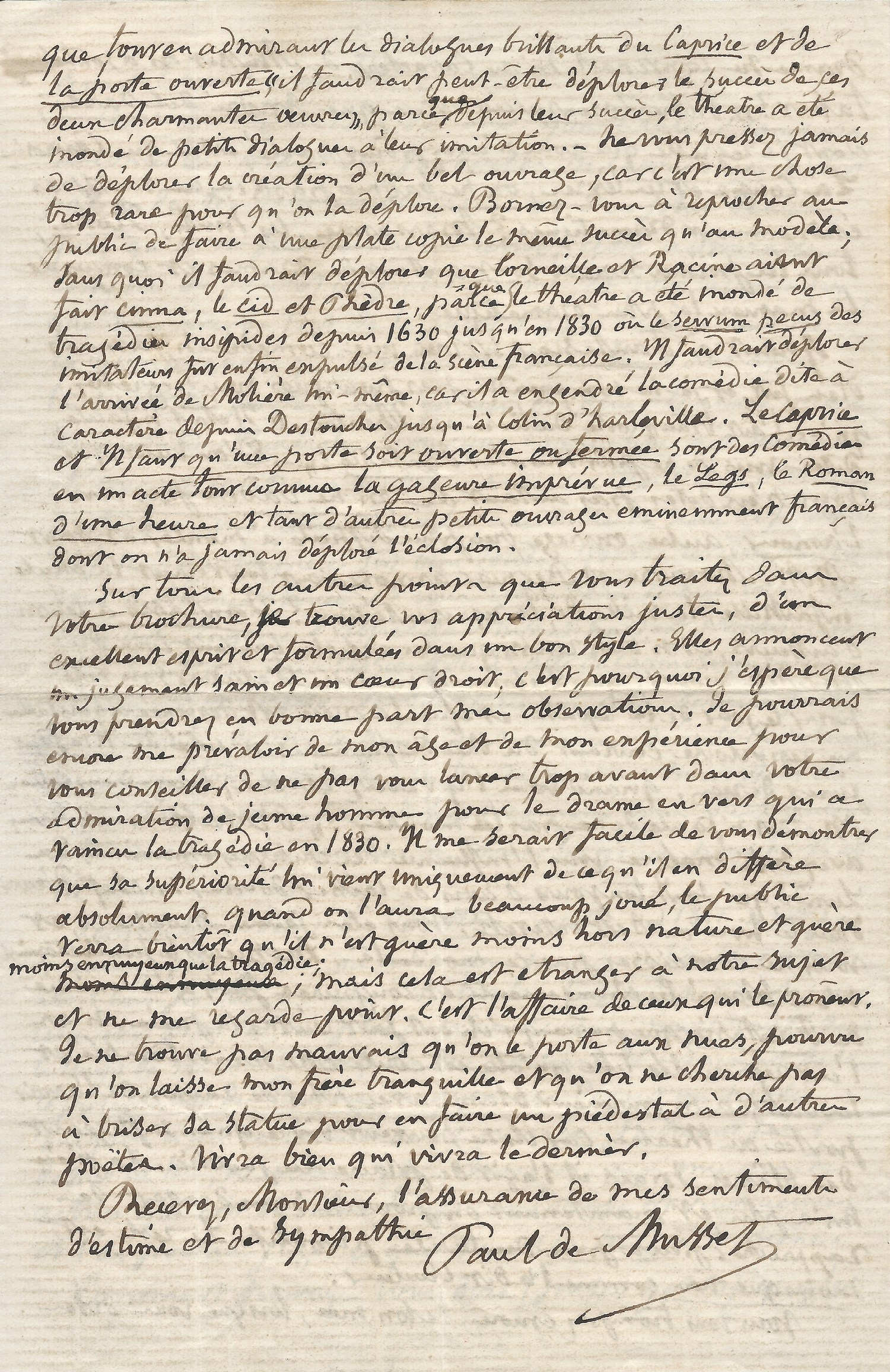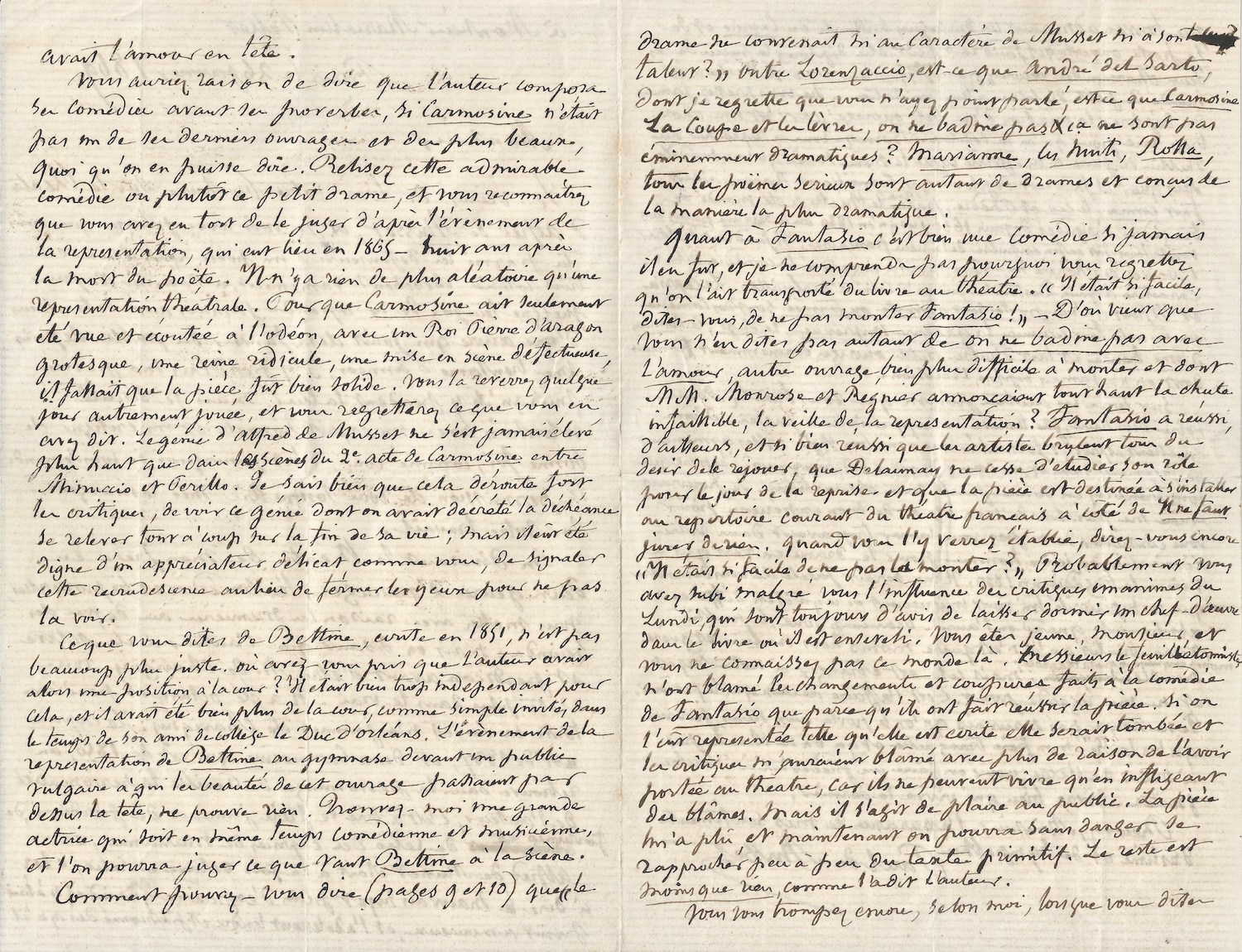Paul de MUSSET (1804.1880)
Autograph letter signed to Marcellin Pellet.
Four pages in-8°. Residue of collector's stamp.
Paris, January 26, 1869.
“… let my brother be left alone and not try to break his statue, to make it a pedestal for other poets …”
The theater and creativity of Alfred de Musset valiantly defended by his brother.
_______________________________________________
“Sir, I have just read your brochure on the theater of Alfred de Musset , and I see with pleasure that you are among the defenders of a poet whom two or three cliques have been vainly seeking to demolish for some time. I never respond to the detractors of a work that has enjoyed public favor for around thirty years; I would lose my effort since they lose theirs, but I willingly discuss with an honest mind and a critic in good faith, like you, which is why I ask your permission to submit my remarks to you on your work.
By dividing my brother's theater into two genres of works, comedies and proverbs, you rightly place the former above the latter; but by saying that the author was Octave and Perdican before being M. de Chavigny, you are no longer correct. He was Octave and Perdican all his life, and was never Chavigny. Le Caprice is from 1837, and in Carmosine which is from 1850, we find in the character of Perillo the personality of the author, that is to say the twin brother of Perdican, Fortunio and Célio from the Caprices of Marianne , because Alfred de Musset was both Octave and Célio, that is to say the bad subject full of experience when he was not in love and the tender and passionate adolescent as soon as he had love on his mind.
You would be right to say that the author composed his comedies before his proverbs, if Carmosine was not one of his last and most beautiful works, whatever one may say. Reread this admirable comedy, or rather this little drama, and you will recognize that you were wrong to judge it based on the event of the performance which took place in 1865 – eight years after the poet's death. There is nothing more random than a theatrical performance. For Carmosine to have even been seen and listened to at the Odeon, with a grotesque King Peter of Aragon, a ridiculous queen, a defective staging, the play had to be very solid. You will see it again some day played differently and you will regret what you said about it. The genius of Alfred de Musset never rose higher than in the scenes of the 2nd act of Carmosine between Minuccio and Perillo. I know well that it greatly disconcerts critics to see this genius whose decline had been decreed suddenly rise again at the end of his life; but it would have been worthy of a delicate appreciator like you to point out this resurgence instead of closing your eyes so as not to see it.
What you say about Bettine , written in 1851, is not much more accurate. Where did you get that the author then had a position at court? He was far too independent for that, and he had been much more at court, as a simple guest, in the days of his college friend, the Duke of Orléans. Bettine 's performance at the gymnasium in front of a vulgar audience to whom the beauties of this work went over their heads, proves nothing. Find me a great actress who is both an actress and a musician, and we can judge what Bettine on stage.
How can you say (pages 9 and 10) that “the drama suited neither Musset’s character nor his talent”? Besides Lorenzaccio , is André del Sarto , of whom I regret that you have not spoken, Carmosine, The Cup and the Lips , On ne badine pas not eminently dramatic? Marianne , Les Nuits , Roma , all the serious poems are so many dramas and conceived in the most dramatic way.
As for Fantasio , it is indeed a comedy if ever there was one, and I don't understand why you regret that it was transported from the book to the theater. “It was so easy, you say, not to produce Fantasio ! » – Where does it come from that you do not say the same about We do not joke with love , another work much more difficult to put together and of which MM. Monrose and Régnier announced out loud the infallible fall, the day before the performance? Fantasio was successful, moreover, and so successful that the artists are all burning with the desire to perform it again , that Delaunay never stops studying his role for the day of the revival and that the piece is destined to become part of the repertoire current of French theater, alongside Il ne sais pas de rien . When you see it established there, will you still say “It was so easy not to mount it?” »
Probably, in spite of yourself, you have suffered the influence of the unanimous critics of Le Lundi, who are always of the opinion of letting a masterpiece sleep in the book where it is buried. You are young, sir, and you do not know this world. Fantasio 's comedy because they made the play successful. If it had been represented as it was written, it would have fallen and the critics would have blamed me with more reason for having brought it to the theater, because they can only live by inflicting blame. But it’s about pleasing the audience. I liked the piece and now we can safely get closer to the original text little by little. The rest is less than nothing as the author said .
You are still wrong, in my opinion, when you say that while admiring the brilliant dialogues of Caprice and the Open Door , "we should perhaps deplore the success of these two charming works", because since their success, the theater was flooded with little dialogues in imitation of them. Never be in a hurry to deplore the creation of a beautiful work, because it is too rare a thing to deplore. Limit yourself to reproaching the public for making a flat copy the same success as the model; otherwise we would have to deplore the fact that Corneille and Racine made Cinna , le Cid et Phèdre , because the theater was flooded with insipid tragedies from 1630 until 1830 when the servum pecus of imitators was finally expelled from the French stage. We should deplore the arrival of Molière himself, because he generated the so-called character comedy from Destouches to Colin d'Harleville. The Caprice and A Door Must Be Open or Closed are one-act comedies, just like the Gageure Intégrée , the Legacy , the Roman d'une Heure and so many other small, eminently French works which have never been deplored. hatching.
On all the other points that you deal with in your brochure, I find your assessments fair, excellent in spirit and formulated in good style. They announce sound judgment and an upright heart, which is why I hope that you will take my observations seriously. I could still take advantage of my age and my experience to advise you not to launch too far into your admiration as a young man for the drama in verse which overcame tragedy in 1830. It would be easy for me to demonstrate to you that its superiority comes only from the fact that it absolutely differs from it. When it has been played a lot, the public will soon see that it is hardly less unnatural and hardly less boring than tragedy; but that is foreign to our subject and does not concern me. It is the business of those who advocate it. I don't find it wrong to praise him to the skies, as long as we leave my brother alone and don't try to break his statue to make it a pedestal for other poets . He who lives last will live well. Please accept, Sir, the assurance of my feelings of esteem and sympathy. Paul de Musset »
_______________________________________________
By freeing himself from traditional conventions of representation to write in particular “shows in an armchair”, Alfred de Musset revolutionized the art of theater in his time, allowing new dramaturgies and stage spaces.
His work, favorably received by the public, sometimes earned him harsh comments from critics. Marcelin Pellet, who was destined for a diplomatic career, seems to have been more measured in his criticism of 1869. Alfred's older brother, Paul, who was after the death of his younger brother the most ardent defender of his memory and his work , nevertheless seizes this opportunity to respond precisely to the critic and direct him to more accuracy.
More than an answer, this text appears as a brilliant presentation, a long dissertation, a manifesto on Musset's theater. By claiming his brother's legacy, by establishing a hierarchy between the different genres of theater, by definitively banishing tragedy and drama in verse, Paul de Musset places his late brother at the pinnacle of 19th century theatrical creation.



